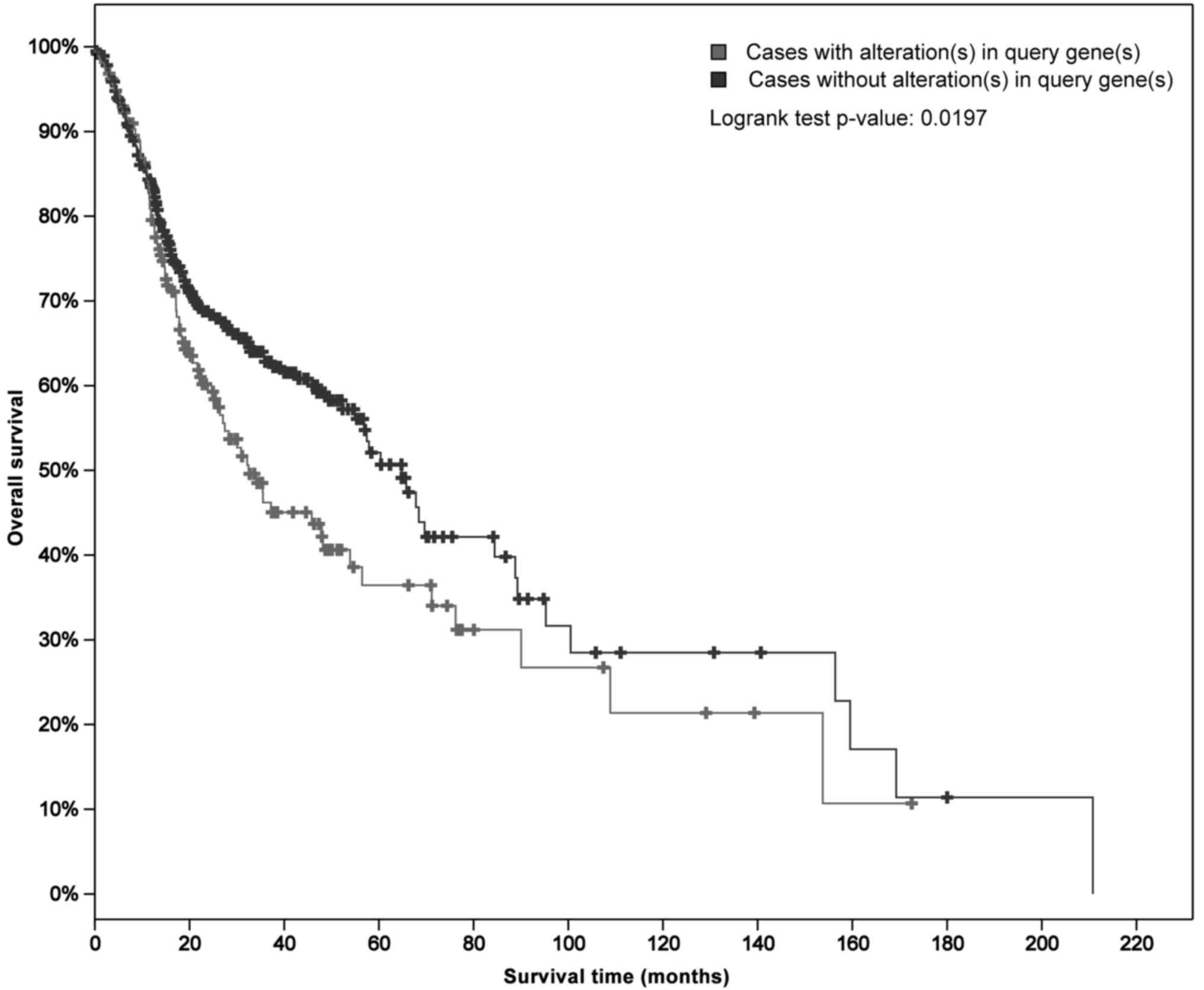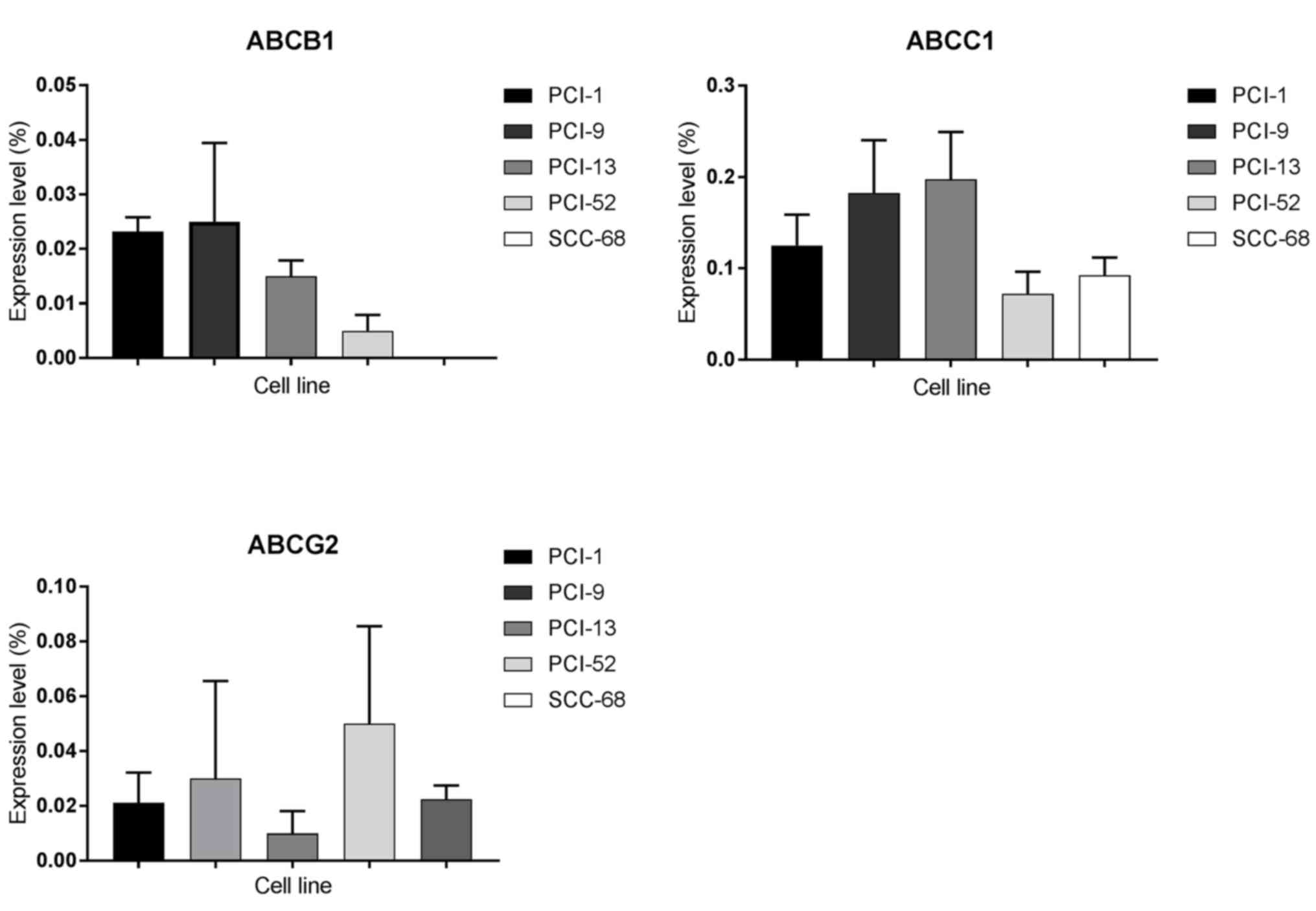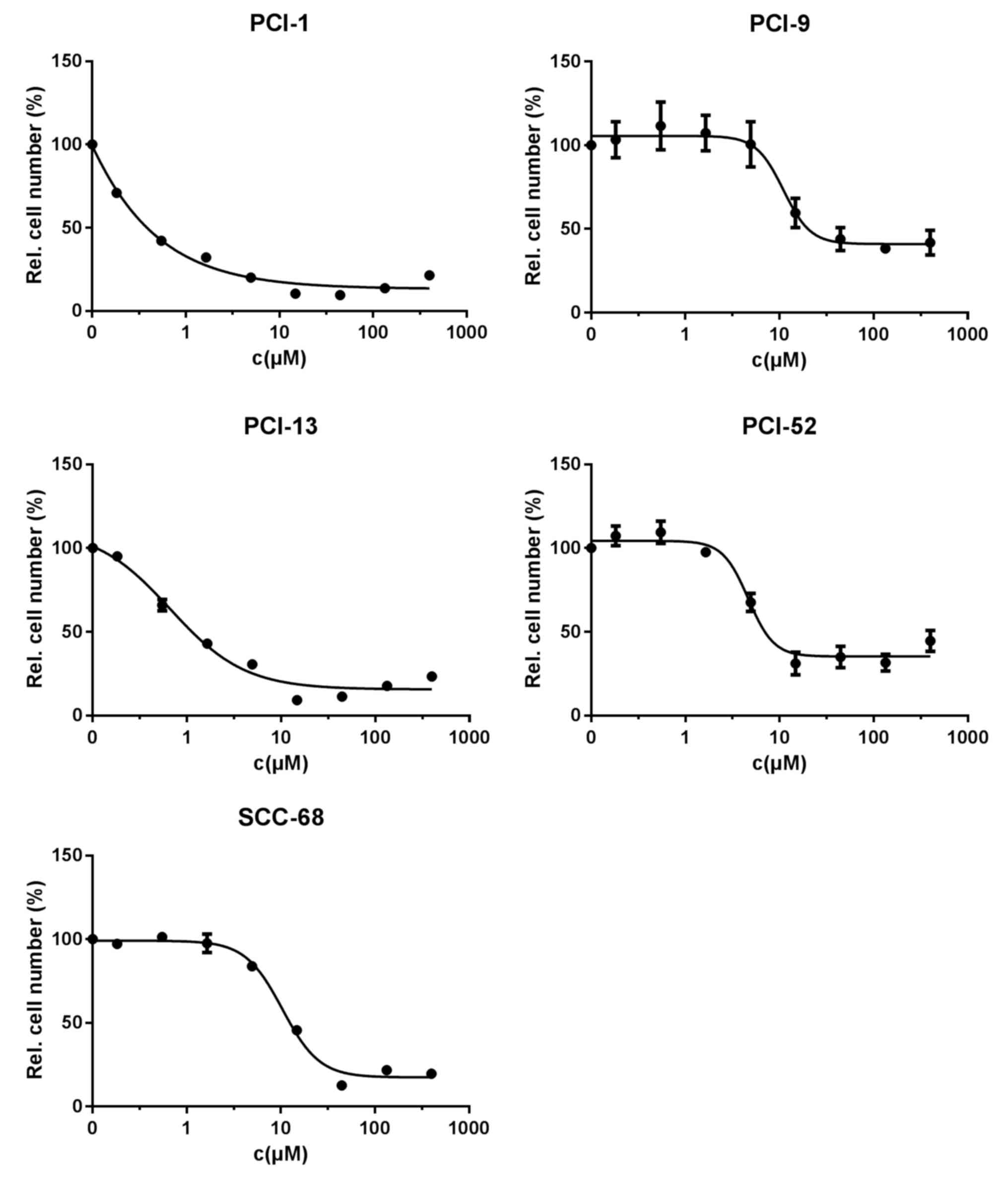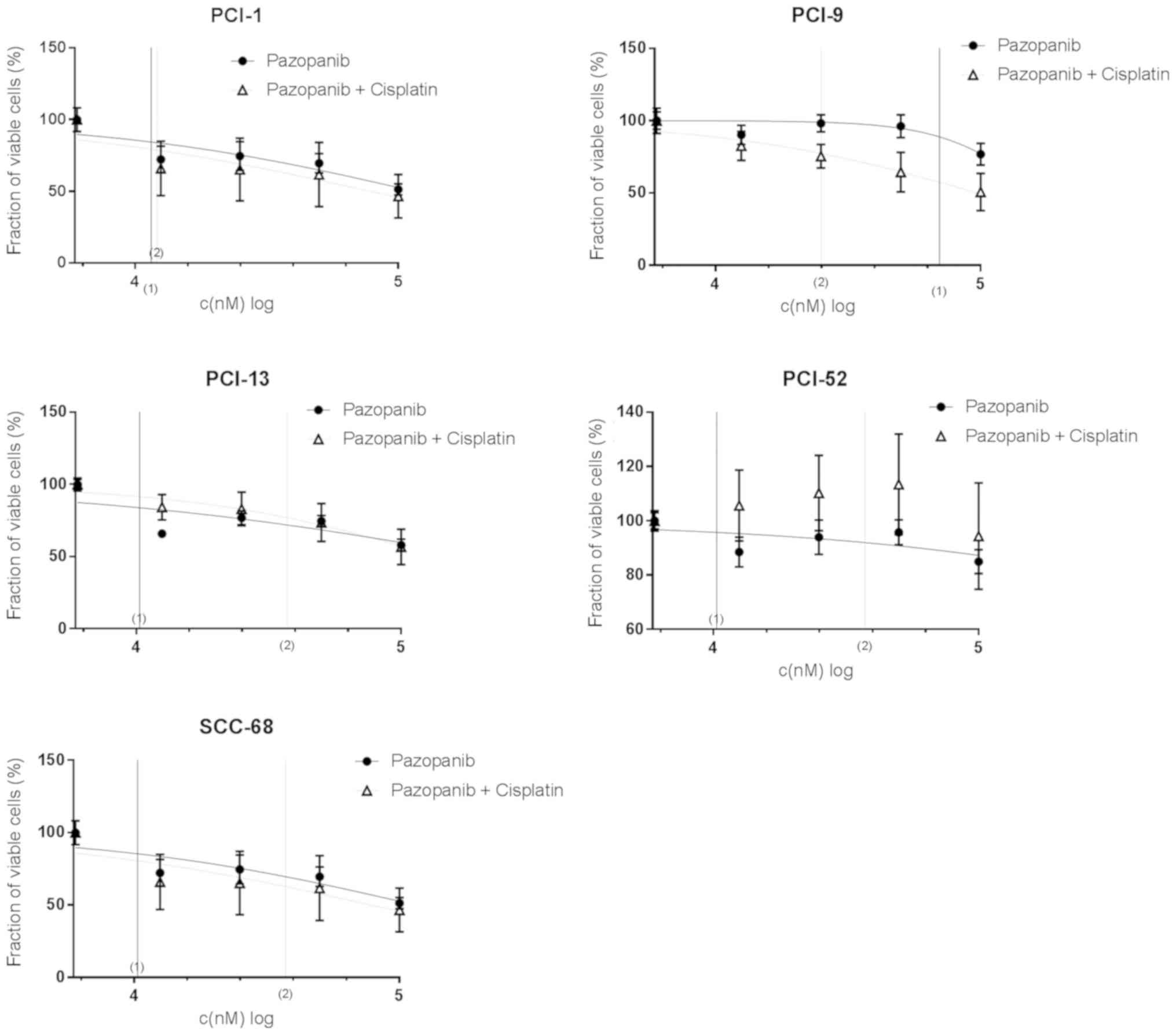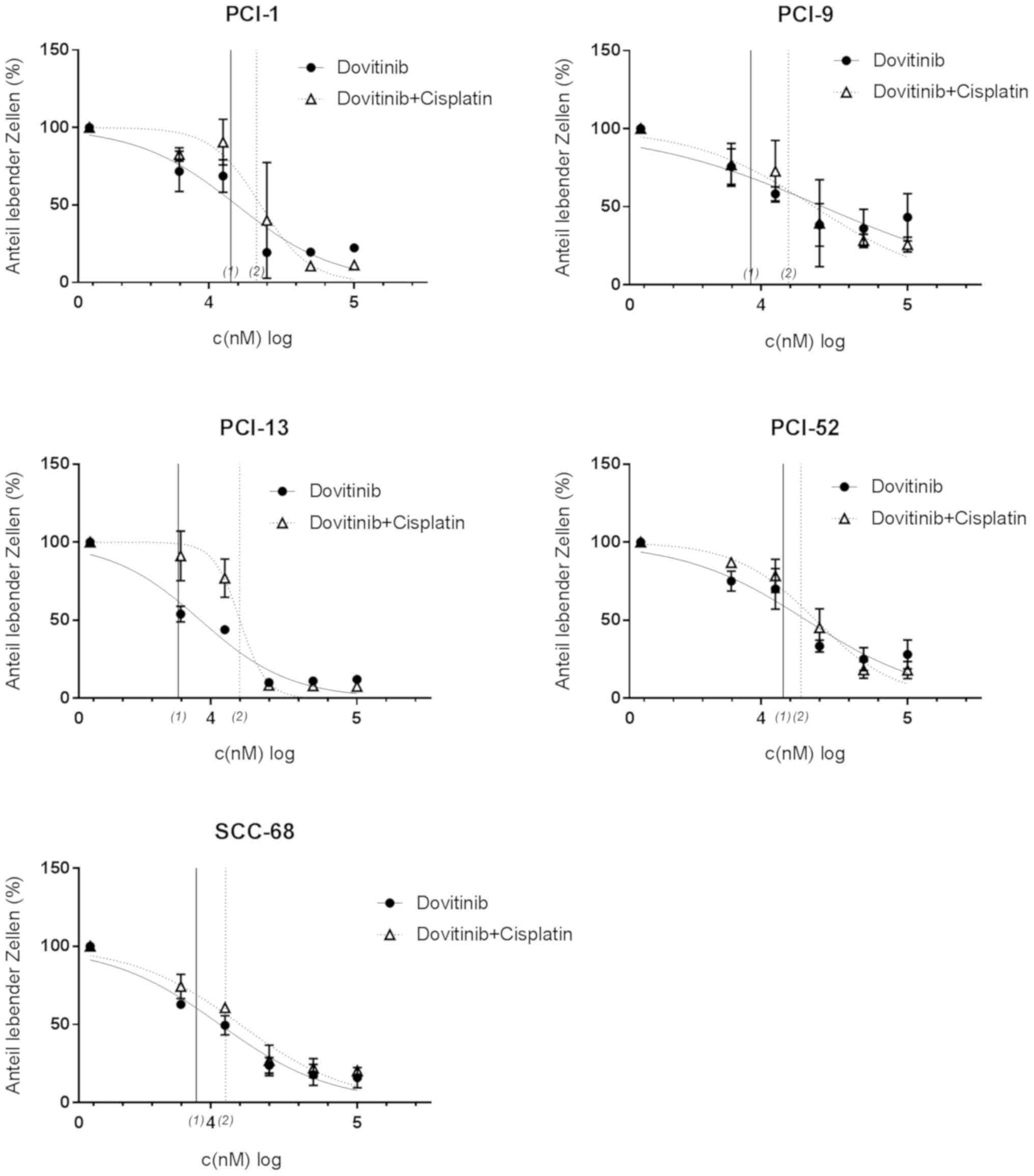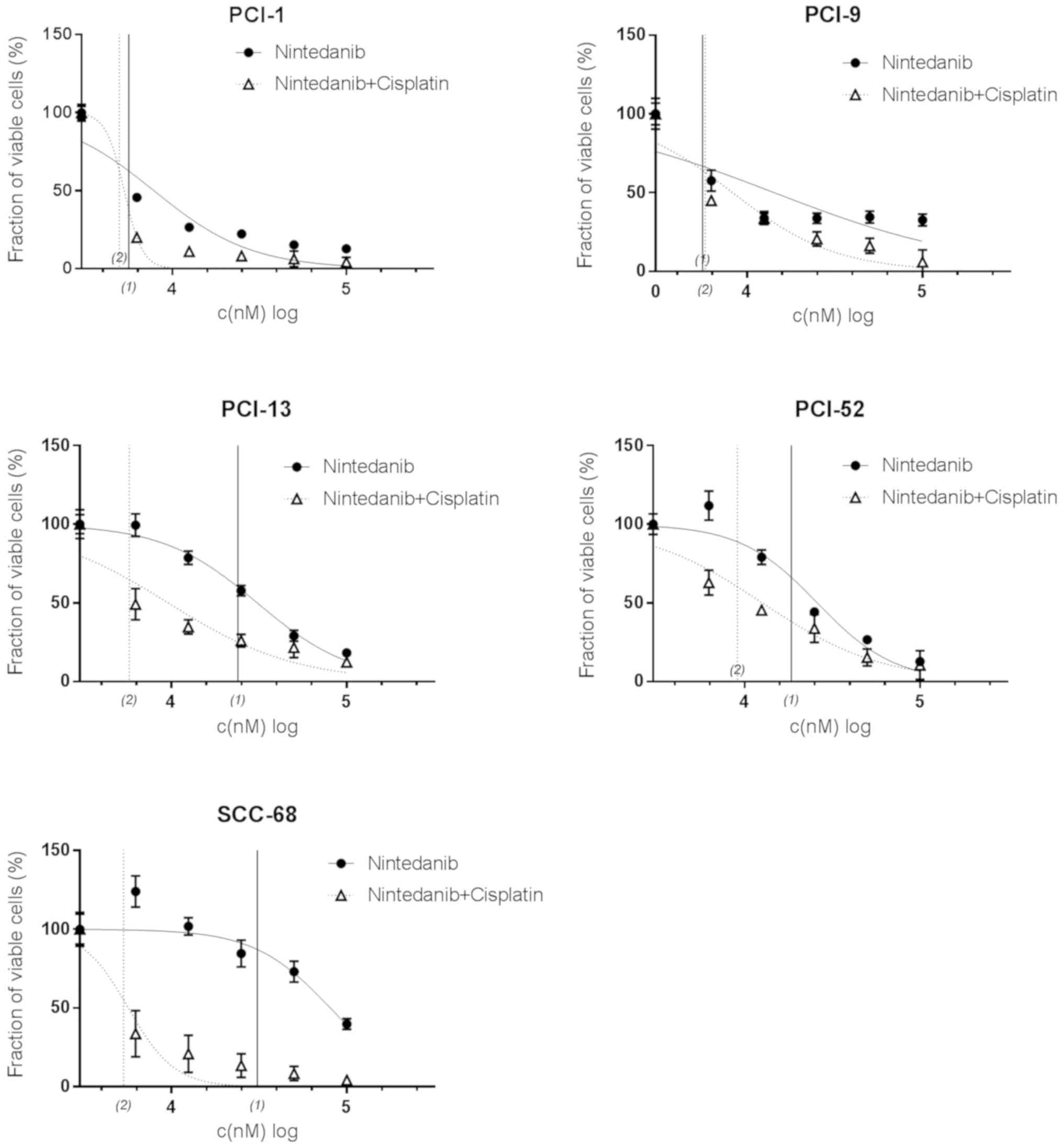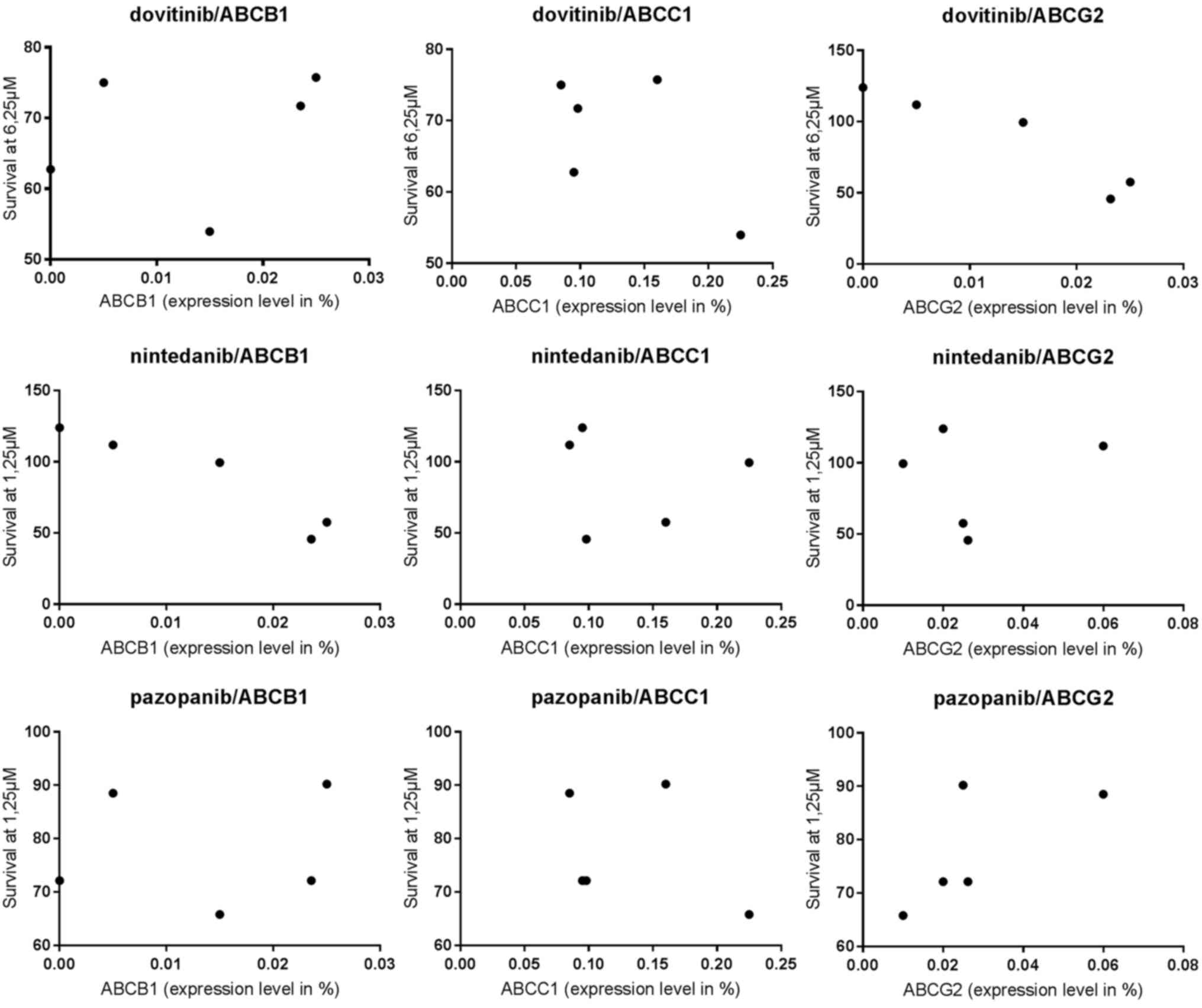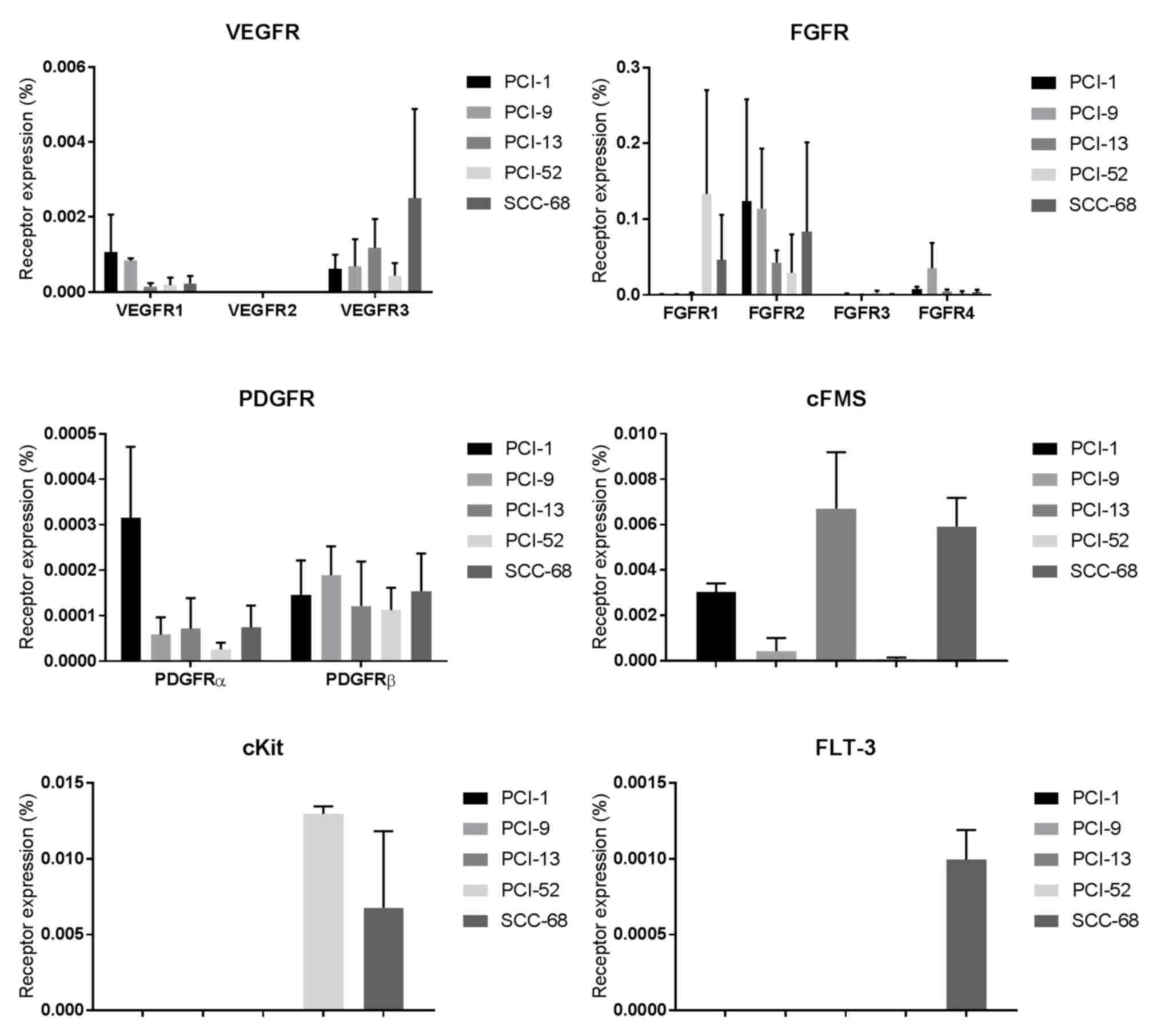|
1
|
Kamangar F, Dores GM and Anderson WF:
Anderson, Patterns of cancer incidence, mortality, and prevalence
across five continents: Defining priorities to reduce cancer
disparities in different geographic regions of the world. J Clin
Oncol. 24:2137–2150. 2006. View Article : Google Scholar : PubMed/NCBI
|
|
2
|
Langley RR and Fidler IJ: Tumor cell-organ
microenvironment interactions in the pathogenesis of cancer
metastasis. Endocr Rev. 28:297–321. 2007. View Article : Google Scholar : PubMed/NCBI
|
|
3
|
Ang KK, Chen A, Curran WJ Jr, Garden AS,
Harari PM, Murphy BA, Wong SJ, Bellm LA, Schwartz M, Newman J, et
al: Head and neck carcinoma in the United States: First
comprehensive report of the longitudinal oncology registry of head
and neck carcinoma (LORHAN). Cancer. 118:5783–5792. 2012.
View Article : Google Scholar : PubMed/NCBI
|
|
4
|
Theile D, Gal Z, Warta R, Rigalli JP,
Lahrmann B, Grabe N, Herold-Mende C, Dyckhoff G and Weiss J:
Antiproliferative efficacies but minor drug transporter inducing
effects of paclitaxel, cisplatin, or 5-fluorouracil in a murine
xenograft model for head and neck squamous cell carcinoma. Cancer
Biol Ther. 15:436–442. 2014. View Article : Google Scholar : PubMed/NCBI
|
|
5
|
Fanucchi M and Khuri FR: Chemotherapy for
recurrent or metastatic squamous cell carcinoma of the head and
neck. Semin Oncol. 31:809–815. 2004. View Article : Google Scholar : PubMed/NCBI
|
|
6
|
Shen DW, Pouliot LM, Hall MD and Gottesman
MM: Cisplatin resistance: A cellular self-defense mechanism
resulting from multiple epigenetic and genetic changes. Pharmacol
Rev. 64:706–721. 2012. View Article : Google Scholar : PubMed/NCBI
|
|
7
|
Doyle LA, Yang W, Abruzzo LV, Krogmann T,
Gao Y, Rishi AK and Ross DD: A multidrug resistance transporter
from human MCF-7 breast cancer cells. Proc Natl Acad Sci USA.
95:15665–15670. 1998. View Article : Google Scholar : PubMed/NCBI
|
|
8
|
Sauerbrey A, Sell W, Steinbach D, Voigt A
and Zintl F: Expression of the BCRP gene (ABCG2/MXR/ABCP) in
childhood acute lymphoblastic leukaemia. Br J Haematol.
118:147–150. 2002. View Article : Google Scholar : PubMed/NCBI
|
|
9
|
Borst P, Evers R, Kool M and Wijnholds J:
A family of drug transporters: the multidrug resistance-associated
proteins. J Natl Cancer Inst. 92:1295–1302. 2000. View Article : Google Scholar : PubMed/NCBI
|
|
10
|
Fletcher JI, Haber M, Henderson MJ and
Norris MD: ABC transporters in cancer: More than just drug efflux
pumps. Nat Rev Cancer. 10:147–156. 2010. View Article : Google Scholar : PubMed/NCBI
|
|
11
|
Silva R, Vilas-Boas V, Carmo H,
Dinis-Oliveira RJ, Carvalho F, de Lourdes Bastos M and Remião F:
Modulation of P-glycoprotein efflux pump: induction and activation
as a therapeutic strategy. Pharmacol Ther. 149:1–123. 2015.
View Article : Google Scholar : PubMed/NCBI
|
|
12
|
Balkwill FR, Capasso M and Hagemann T: The
tumor microenvironment at a glance. J Cell Sci. 125:5591–5596.
2012. View Article : Google Scholar : PubMed/NCBI
|
|
13
|
Hartmann S, Bhola NE and Grandis JR:
HGF/Met Signaling in Head and Neck Cancer: Impact on the Tumor
Microenvironment. Clin Cancer Res. 22:4005–4013. View Article : Google Scholar : PubMed/NCBI
|
|
14
|
Quail DF, Taylor MJ and Postovit LM:
Microenvironmental regulation of cancer stem cell phenotypes. Curr
Stem Cell Res Ther. 7:197–216. 2012. View Article : Google Scholar : PubMed/NCBI
|
|
15
|
Miyake H, Hara I, Gohji K, Yoshimura K,
Arakawa S and Kamidono S: Expression of basic fibroblast growth
factor is associated with resistance to cisplatin in a human
bladder cancer cell line. Cancer Lett. 123:121–126. 1998.
View Article : Google Scholar : PubMed/NCBI
|
|
16
|
Wakulich C, Jackson-Boeters L, Daley TD
and Wysocki GP: Immunohistochemical localization of growth factors
fibroblast growth factor-1 and fibroblast growth factor-2 and
receptors fibroblast growth factor receptor-2 and fibroblast growth
factor receptor-3 in normal oral epithelium, epithelial dysplasias,
and squamous cell carcinoma. Oral Surg Oral Med Oral Pathol Oral
Radiol Endod. 93:573–579. 2002. View Article : Google Scholar : PubMed/NCBI
|
|
17
|
Patel A, Tiwari AK, Chufan EE, Sodani K,
Anreddy N, Singh S, Ambudkar SV, Stephani R and Chen ZS: PD173074,
a selective FGFR inhibitor, reverses ABCB1-mediated drug resistance
in cancer cells. Cancer Chemother Pharmacol. 72:189–199. 2013.
View Article : Google Scholar : PubMed/NCBI
|
|
18
|
Cerami E, Gao J, Dogrusoz U, Gross BE,
Sumer SO, Aksoy BA, Jacobsen A, Byrne CJ, Heuer ML, Larsson E, et
al: The cBio cancer genomics portal: An open platform for exploring
multidimensional cancer genomics data. Cancer Discov. 2:401–404.
2012. View Article : Google Scholar : PubMed/NCBI
|
|
19
|
Gao J, Aksoy BA, Dogrusoz U, Dresdner G,
Gross B, Sumer SO, Sun Y, Jacobsen A, Sinha R, Larsson E, et al:
Integrative analysis of complex cancer genomics and clinical
profiles using the cBioPortal. Sci Signal. 6:pl12013. View Article : Google Scholar : PubMed/NCBI
|
|
20
|
Brands RC, Herbst F, Hartmann S, Seher A,
Linz C, Kübler AC and Müller-Richter UDA: Cytotoxic effects of
SMAC-mimetic compound LCL161 in head and neck cancer cell lines.
Clin Oral Investig. 20:2325–2332. 2016. View Article : Google Scholar : PubMed/NCBI
|
|
21
|
Schmittgen TD and Livak KJ: Analyzing
real-time PCR data by the comparative C(T) method. Nat Protoc.
3:1101–1108. 2008. View Article : Google Scholar : PubMed/NCBI
|
|
22
|
Brands RC, Knierim LM, De Donno F,
Steinacker V, Hartmann S, Seher A, Kübler AC and Müller-Richter
UDA: Targeting VEGFR and FGFR in head and neck squamous cell
carcinoma in vitro. Oncol Rep. 38:1877–1885. 2017.
View Article : Google Scholar : PubMed/NCBI
|
|
23
|
Lee JG and Wu R: Erlotinib-cisplatin
combination inhibits growth and angiogenesis through c-MYC and
HIF-1α in EGFR-mutated lung cancer in vitro and in vivo. Neoplasia.
17:190–200. 2015. View Article : Google Scholar : PubMed/NCBI
|
|
24
|
Tsang RY, Al-Fayea T and Au HJ: Cisplatin
overdose: Toxicities and management. Drug Saf. 32:1109–1122. 2009.
View Article : Google Scholar : PubMed/NCBI
|
|
25
|
Sweeny L, Zimmermann TM, Liu Z and
Rosenthal EL: Evaluation of tyrosine receptor kinases in the
interactions of head and neck squamous cell carcinoma cells and
fibroblasts. Oral Oncol. 48:1242–1249. 2012. View Article : Google Scholar : PubMed/NCBI
|
|
26
|
Homer JJ, Greenman J and Stafford ND:
Angiogenesis in head and neck squamous cell carcinoma. Clin
Otolaryngol Allied Sci. 25:169–180. 2000. View Article : Google Scholar : PubMed/NCBI
|
|
27
|
Cao Y: Antiangiogenic cancer therapy: Why
do mouse and human patients respond in a different way to the same
drug? Int J Dev Biol. 55:557–562. 2011. View Article : Google Scholar : PubMed/NCBI
|
|
28
|
Callaghan R: Providing a molecular
mechanism for P-glycoprotein; why would I bother? Biochem Soc
Trans. 43:995–1002. 2015. View Article : Google Scholar : PubMed/NCBI
|
|
29
|
Coyle B, Kessler M, Sabnis DH and Kerr ID:
ABCB1 in children's brain tumours. Biochem Soc Trans. 43:1018–1022.
2015. View Article : Google Scholar : PubMed/NCBI
|
|
30
|
Hlaváč V and Souček P: Role of family D
ATP-binding cassette transporters (ABCD) in cancer. Biochem Soc
Trans. 43:937–942. 2015. View Article : Google Scholar : PubMed/NCBI
|
|
31
|
Chen CL, Sheen TS, Lou IU and Huang AC:
Expression of multidrug resistance 1 and
glutathione-S-transferase-Pi protein in nasopharyngeal carcinoma.
Hum Pathol. 32:1240–1244. 2001. View Article : Google Scholar : PubMed/NCBI
|
|
32
|
Lo Muzio L, Staibano S, Pannone G,
Mignogna MD, Serpico R, Rubini C, Fioroni M, Fanali S and Piattelli
A: The human multidrug resistance gene (MDR-1): Immunocytochemical
detection of its expression in oral SCC. Anticancer Res.
20:2891–2897. 2000.PubMed/NCBI
|
|
33
|
Uematsu T, Hasegawa T, Hiraoka BY, Komatsu
F, Matsuura T, Yamada AS and Yamaoka M: Multidrug resistance gene 1
expression in salivary gland adenocarcinomas and oral squamous-cell
carcinomas. Int J Cancer. 92:187–194. 2001. View Article : Google Scholar : PubMed/NCBI
|
|
34
|
Xiang QF, Wang F, Su XD, Liang YJ, Zheng
LS, Mi YJ, Chen WQ and Fu LW: Effect of BIBF 1120 on reversal of
ABCB1-mediated multidrug resistance. Cell Oncol (Dordr). 34:33–44.
2011. View Article : Google Scholar : PubMed/NCBI
|
|
35
|
Weiss J, Theile D, Dvorak Z and Haefeli
WE: Interaction potential of the multitargeted receptor tyrosine
kinase inhibitor dovitinib with drug transporters and drug
metabolising enzymes assessed in vitro. Pharmaceutics. 6:632–650.
2014. View Article : Google Scholar : PubMed/NCBI
|
|
36
|
Roche S, Pedersen K, Dunne G, Collins D,
Devery A, Crown J, Clynes M and O'Connor R: Pharmacological
interactions of TKIs with the P-gp drug transport protein. J Clin
Oncol. 30:2536. 2012.
|
|
37
|
Atkinson A Jr, Huang SM, Lertora JJL and
Markey SP: Principles of clinical pharmacology. 3. pp. 217–237.
Academic Press; Cambridge, MA, USA: 2012
|
|
38
|
Mandery K, Glaeser H and Fromm MF:
Interaction of innovative small molecule drugs used for cancer
therapy with drug transporters. Br J Pharmacol. 165:345–362. 2012.
View Article : Google Scholar : PubMed/NCBI
|
|
39
|
Galsky MD, Posner M, Holcombe RF, Lee KM,
Misiukiewicz K, Tsao CK, Godbold J, Soto R, Gimpel-Tetra K, Lowe N
and Oh WK: Phase Ib study of dovitinib in combination with
gemcitabine plus cisplatin or gemcitabine plus carboplatin in
patients with advanced solid tumors. Cancer Chemother Pharmacol.
74:465–471. 2014. View Article : Google Scholar : PubMed/NCBI
|















